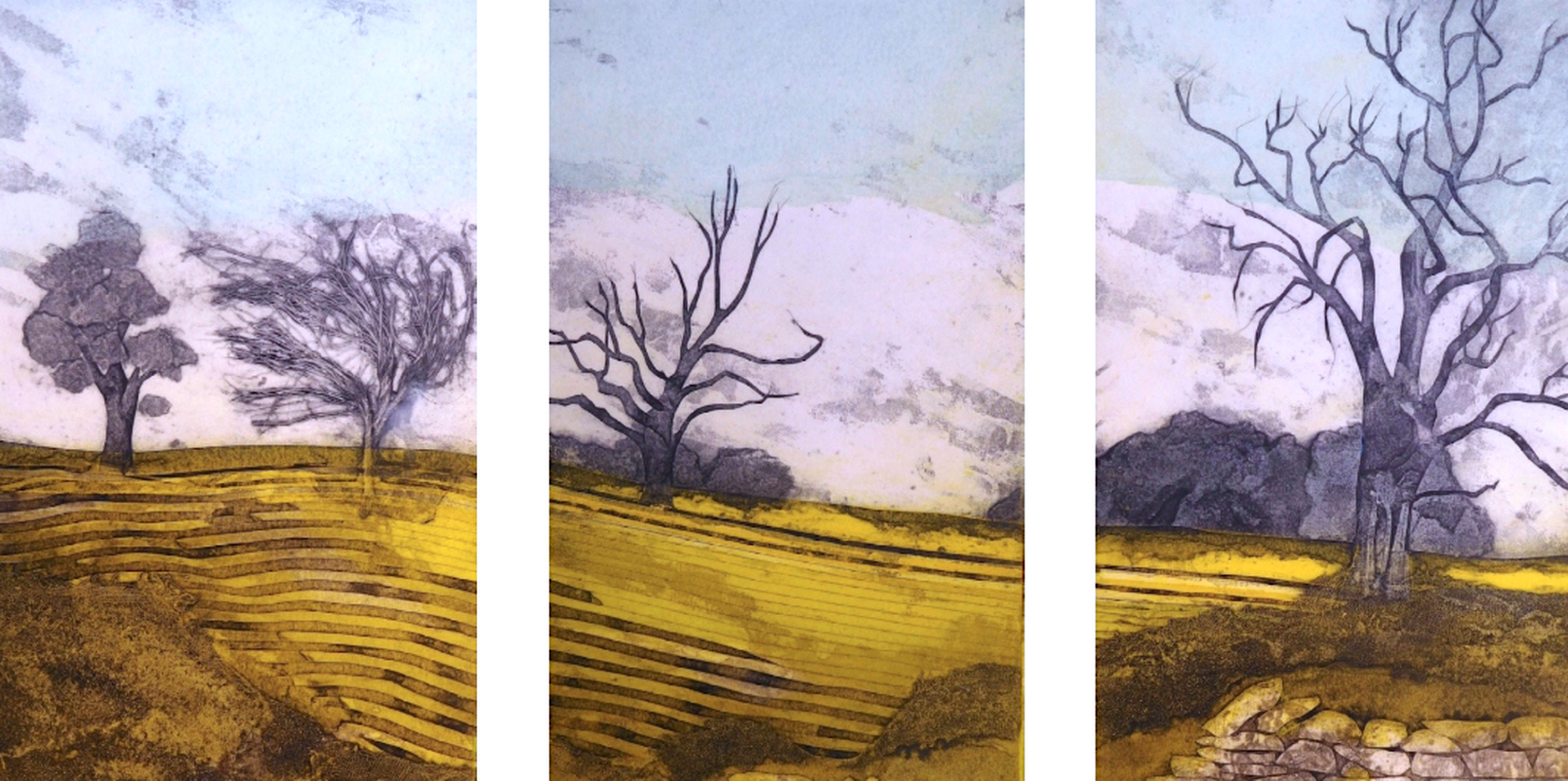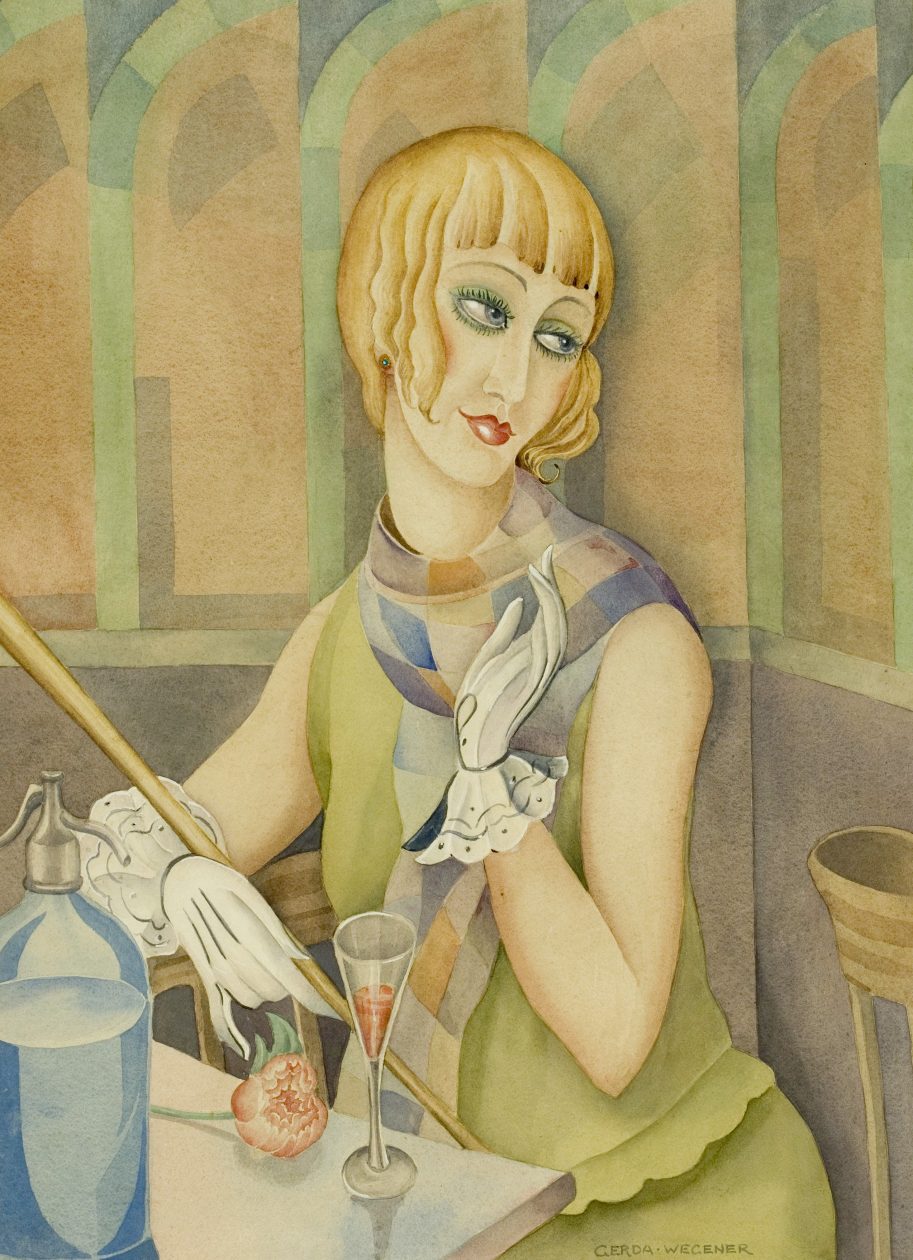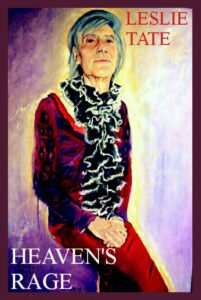
SARAH ROSS-THOMPSON AND THE ART OF COLLAGRAPHED PRINTS
I interviewed artist Sarah Ross-Thompson whose exceptional Collagraphed prints use fabrics, lichen, porridge and string to create images of the dramatic Scottish Highlands where she


As a transvestite I used to believe in ‘the woman within’. I felt, when I cross-dressed, closer to my ‘feminine side’ – though what I experienced was more a release of pressure, a kind of pleasurable lift as if I was walking out after being indoors for a month. ‘Relief dressing’ was good for me; it increased my sensitivity, making me softer, calmer and more alive. And to dress in front of others required a special kind of ‘tuning out’, a deliberately-willed blindness where I didn’t ask questions. I was on display but chose not to know it. Though, of course, I was vulnerable. It was as if I’d been turned inside out, with all my feelings on show. And it was that exposure that both set me apart and made me strong.

My position was simple. I believed I was being more honest than the other men, the straight guys, who had the same feelings but were afraid to show them. In my private imaginings they were the stern men of action who kept at a distance and always wore a mask. But my attempts to pull rank didn’t get far. The men I had in mind simply shrugged their shoulders and carried on with their business, remarking casually that it didn’t bother them. Perhaps I wanted a reaction, a kind of reverse validation where they showed their dislike, or told me I was being stupid.
Sometimes we thrive on rejection. I found that being in opposition gave me definition and made me seem strong – even to myself. There was a magic about it, an inner frisson from being alive and untouchable; and while I was taking my stand, I knew who I was.
But there were other voices inside, telling me to stay hidden:

But of course it wouldn’t go away or stay hidden.
I had plenty of time to get used to my trans-self, from the private struggles of youth, through my ‘harmless’ dressing in the house, to being ‘outed’ by the papers and appearing in public. I learned on the way that going public is a continuous effort – and who wants to live on permanent emergency call-out? Because to keep up an effective presence involves a high-energy readiness to deal with other people’s reactions, fielding anything from awkward looks to rude jokes and direct challenges. It’s oh-so much easier to blend in, put on a suit and walk around being ‘normal’.
And it’s natural to go through phases, sometimes standing up to be counted and sometimes ducking out.
But as long as part of me remained undercover I could only see myself as a rara avis, defined by being ‘other’. And my negation went deep. So for much of the time I was a functioning doer and achiever, but when it came to self, I lacked connection or inner balance. Like a child in an exam, I was too busy – or nervous – to understand what was happening.
To give a few examples:
Much like the so-called ‘straight guys’ I worked flat out. Nothing could stop me, my purpose was to get things done. And to go home at night having dealt with several major crises gave me a purpose.
I was expressive, but not in that way. I’d learned at school that being effeminate was a no-no. Being caught out smelling flowers or reading poetry soon led to attacks, so it was better to keep my girliness hidden.
As a young adult, I used diversionary tactics. So I’d shout rather than cry, speak out, laugh and be energetic, keeping up a pumped-up front – especially to myself.
Even when I went public, I still felt brittle and exposed. I imagined people were watching and passing judgement. In a sense I didn’t quite know where to put myself.
I do remember a couple of incidents.
In one, we were celebrating an election win at our house and the rooms were full of left-wing Labour friends. I have a memory of dancing downstairs to thunderous music, wearing high heels and a long kaftan. As a tall man, I was aware – and secretly proud of – the balancing act required. Part of me was dancing in darkness just for its own sake, and part of me wanted to be admired for what I could do. I felt safe in this company to show my girlie-self.
Later, during a visit to the toilet, I realised my mistake. On the way there I passed J., a councillor who I’d campaigned with. He was young and slightly-built with red hair and a foxy, rather guarded expression. When I returned to the landing he was standing in a doorway next to his girlfriend, watching me. I could see he had something to say so I got in first, telling a story involving a mutual friend. J. looked me up and down as if he hadn’t heard a word.

“What’s this about?” he said. His eyes had hardened, but he was grinning.
I knew what he meant but chose to put it off. “You enjoying the party?” I asked.
“Why’re you like that?” he asked.
“How do you mean?”
“Why do you wear that?”
“Why?”
“Yes, why?”
“It’s my choice.”
“But what for?”
“What for? For nothing. For myself.”
“It doesn’t suit.”
“Bloody hell.”
“You shouldn’t be like that. Looks wrong.”
Shrugging, I began to walk away, but then turned back. I couldn’t leave it. He’d got under my skin, and the anger made me hot and breathless. “Piss off,” I hissed. “You wouldn’t dare say that to a woman.”
Behind that statement was so much he couldn’t understand. My childhood fears, the inner flirtation with being a woman; most of all, my balance between confusion and defiance.
It was a risk because I’d given him an excuse to take if further. In the past at school, swearing at someone guaranteed a beating, but he didn’t call out or come after me, so perhaps he wasn’t absolutely serious. Looking back now, I think I should have talked to him.
In the other incident I was standing in a pub with a group of friends. I was wearing jeans and a red, flower-patterned blouse. I remember two men by the bar, staring and exchanging remarks. There was a ha-ha sneeriness about them, a kind of chin-out invitation directed at me. I knew their purpose was to weaken me. The pub was their territory and their hard, threatening stares said, ‘keep out’.
Nobody else noticed, and I didn’t tell my friends. I was ashamed, and thought, or hoped, I might be mistaken. But my own shakiness was a reminder of bullying at school. When we left, I wanted people by me, but I didn’t have the courage to admit it. We drifted back to the cars in ones and twos, with everyone enjoying themselves except me.
The men didn’t follow and nothing happened, but I felt their stares for a long time afterwards. In a way, they’d won.
Then there were the stories of other people.
But of course people survive, and many of them were supported by close friends or by some of their family.
Nowadays I’m out in public. I go to the supermarket on my own wearing women’s clothes and everyone can see I’m a man because I don’t wear a wig or make-up. It’s the result of writing a memoir about my cross-dressing and having to live up to it. And I’m lucky because I live in a liberal-ish town where people don’t want to fight me. So it feels particularly good to be myself and behave naturally without being on show, even though no one else looks much like me.
 So what about the book?
So what about the book?
Heaven’s Rage is not a confessional, and although it contains my trans story, it aims to cover a full range of experience. To quote ajh, a reviewer on Amazon:
‘Heaven’s Rage is autobiographical yet touches the universal. It has ambitious scope. There are sections on music and gardens, but the author really strikes his form on vulnerability, cross-dressing, illness, alcoholism, relationships. This could be depressing, yet it is uplifting.
We enter the author’s life and live it through with him, feeling the hurts and the awkward compensations of vulnerability, the separateness of difference. We almost touch the quality of the cross-dressing feeling. As we do this, quietly, quietly, an alchemy is turning the iron of our heart to gold. In a microcosm of his own life experience, we end up as he does with a quiet, complex understanding of many of the issues. Walking through them our attitude softens, becomes more nuanced. I want to use the word love, yet this is never spelt out.
I sense that the author could only have written this book now, after a long assimilation and integration of the many subtle aspects. I look forward very much to reading a novel from someone who has done this level of inner work.’
In fact writing a memoir involves turning complex experience into a single point of view, which meant I had to simplify my memories into discrete incidents, creating a clear, consistent self-image. Of course, fitting the real person to an image isn’t always easy, and words narrow life, but it gave me a framed space where people can look in and ask questions – and they do, in their heads. It’s a safe place I go back to where I’m in the picture as both subject and object. The world’s out there, people are walking back and forth, sometimes they’re staring or waving, but I’m quite comfortable. They’re guests at my party, seeing me as I am, and if they don’t like it, the loss is theirs.
And the men?
I understand now their jokes and resistance, their willingness to do. For most men, what I wear doesn’t matter, they’re direct and fair-minded and life’s more important. And I’ve been cross-dressed in toilets and on trains with football supporters and had lots of support from caring men who act independently without fear or favour. Admittedly, there are still a few blokey blokes whose looks scare me. But I tell myself to keep walking and look the other way because I can feel my hot-and-shaky male anger bubbling up – and that’s not how I want to be. But of course, if I’m honest, there’s always a macho somewhere inside. I can swear and shout like the next man, the only difference is that for me it’s more important to recognise the man and the woman inside, to talk about them and know them, and not be in denial.
Leslie Tate
BLURB
Heaven’s Rage is an imaginative autobiography. Reporting on feelings people don’t usually own up to, Leslie Tate explores addiction, cross-dressing and the hidden sides of families. Writing lyrically, he brings together stories of bullying, childhood dreams, thwarted creativity and late-life illness, discovering at their core the transformative power of words to rewire the brain and reconnect with life.
Buying Heaven’s Rage:

ABOUT LESLIE TATE’S BOOKS:
In the next blog, LIVING TRUTHFULLY UNDER IMAGINARY CIRCUMSTANCES, I describe my target audience, USP, genre and why I really write .

I interviewed artist Sarah Ross-Thompson whose exceptional Collagraphed prints use fabrics, lichen, porridge and string to create images of the dramatic Scottish Highlands where she

Part 2 of my interview with Mark Statman looks closely at Mark’s Latin American poetic influences, his life in Mexico and ends with an extract

I interviewed international poet and translator Mark Statman about Volverse/Volver, his 14th published collection. Mark, who has won national arts awards, is Emeritus Professor of Literary

I interviewed Lisa Dart, finalist in the Grolier, Aesthetica and Troubadour Poetry Prizes and author of The Linguistics of Light (poems, Salt, 2008), Fathom (prose

I interviewed writer Julia Lee Barclay-Morton about her experience of autism. Julia began as an experimental dramatist in New York, moving to the UK to
| Cookie | Duration | Description |
|---|---|---|
| cookielawinfo-checkbox-analytics | 11 months | This cookie is set by GDPR Cookie Consent plugin. The cookie is used to store the user consent for the cookies in the category "Analytics". |
| cookielawinfo-checkbox-functional | 11 months | The cookie is set by GDPR cookie consent to record the user consent for the cookies in the category "Functional". |
| cookielawinfo-checkbox-necessary | 11 months | This cookie is set by GDPR Cookie Consent plugin. The cookies is used to store the user consent for the cookies in the category "Necessary". |
| cookielawinfo-checkbox-others | 11 months | This cookie is set by GDPR Cookie Consent plugin. The cookie is used to store the user consent for the cookies in the category "Other. |
| cookielawinfo-checkbox-performance | 11 months | This cookie is set by GDPR Cookie Consent plugin. The cookie is used to store the user consent for the cookies in the category "Performance". |
| viewed_cookie_policy | 11 months | The cookie is set by the GDPR Cookie Consent plugin and is used to store whether or not user has consented to the use of cookies. It does not store any personal data. |
18 responses
A very interesting post and lovely review, Leslie. I was reading an interview on Linda Hill’s blog the other day about a book written by the child of a cross-dressing man. It lead me to wonder how the children react and manage their own challenges with a cross dressing parent.
Thanks so much, Robbie. You’re a great reader as well as an author/reviewer/blogger and, of course, parent, cake-maker and financial whiz! If you could remember the title of that book I’d be very interested…
I directed myself to your blog from Twitter. You write with such congruence and veuve. Very enjoyable x
Thank you, I’m very glad you enjoyed it. It’s part of the next book I’m putting together and will be offering to publishers in Autumn.
Hi Leslie!
A fascinating read. I totally appreciate where you’re coming from because I’ve known people in exactly your position or similar – such as gender dysphoria, or gayness – and can never quite understand the negative attitudes of some people towards it. It is what it is and it doesn’t bother me in the slightest. In fact I applaud individuals such as yourself for ‘coming out’ and saying: ‘This is me!’. There is room in this world for everone, and the sooner people are educated into understanding these situations – as in my case, depression – the better.
Go for it, Leslie! ?
Jo
And go for Jo! People are still reading and liking your interview – it’s very honest. https://leslietate.com/2017/07/3759/
Thank you so much, Leslie. We creatives must stick together!
Jo
Yes, please stay active, creative and adventurous Jo. I believe everyone has that side in them. I used to see it when I taught in inner-city. People who had been negatively labelled often had great potential, given half a chance. It’s about valuing life and building on strengths; positive reinforcement rather than negative put-downs. Although, I have to be honest, I’m fiercely critical of my own writing – but that’s between me and the text. 🙂 🙂 🙂
? I know that feeling! Leslie – I’ve been writing my novel forever. Would you be interested in reading a chapter or two?
Jo
Sorry, Jo, I have to be very careful with my time if I’m going to blog once a week, support Sue with her school visits and friends who aren’t mobile, visit my children, work for political change, worship as a Quaker and continue to write myself. I’m always open to another blog if you have new material. 🙂 🙂 🙂
Such a brilliant article which resonates with me, the feminine inside, desperately wanting to be freed and allowed to fly. And it needs to be said, and said and said again until society breaks down the stereotyped “Macho man”, who typically is the opposite and that is why he “pretends”. But not just the men. Women also. My wife stopped me as “She wanted me to be a man, and I obviously had a mental problem”, but we love each other, so …. :(. What a totally confused/brainwashed society we live in.
I love your comment, it’s so honest. Please stay in touch on Facebook and/or Twitter. Am I following you? L x
My children, in their 20s, have gender fluid friends and are relaxed with the whole thing…I’m not uncomfortable, but I do need information, because so much of this has been hidden for so much of my life. So a post like this is so useful and communicative, giving insight into feelings, everyday features of your life and underlying themes. I’m considering a transgender character in my writing but I’d be clutching at stereotypical straws without articles like this to clarify an individual experience. Still not sure if I have the right to go ahead with it, or if it will fit my plot, but I do know the more material like this there is around, the more representation you will ultimately have in the arts, media, sport, business etc. Thank you.
Thanks so much Jessica, that’s kind of you. In my view transgendered people are, like everyone else, varied and diverse. As we emerge from the shadows we become more distinct and individual, just like gay people did from the 70s onwards. If you’re interested, my memoir ‘Heaven’s Rage’ has a more detailed, in-depth version of my childhood/teenage/adult story at: https://leslietate.com/shop/heavens-rage/ 🙂 🙂 🙂
Braving the Wilderness in such a beautifully gentle way… Hugely inspiring… Just ordered the book. Thank you Leslie 🙂
Oh, thank you Agnieszka, you’re so kind! I’m hoping to meet you on Wednesday at Berkhamsted Live. Please say hello. I can sign your book at the show if it has arrived by then. 🙂
Hello Leslie,
No problem at all (re/my novel!). I have similar problems (re/time). I’d love to send you a new blog post if that was at all possible. I’ll send one to you and see what you think. I’m putting a link to your blog on mine and will write a small feature about you.
Jo
Thank you Jo! Yes, please send me something. What we have to avoid is going over exactly the same ground as the last two blogs by you – but a new angle on previous material would be great, as would be new material. I’m looking forward to seeing what you write. L x